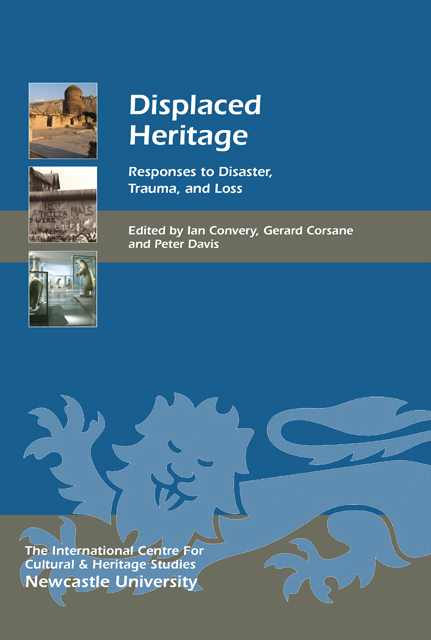Book contents
- Frontmatter
- Contents
- List of Illustrations
- Acknowledgments
- List of Abbreviations
- Preface
- Introduction
- Displaced Heritage: Histories and Tourism
- Displaced Heritage: Trauma, Confinement and Loss
- Displaced Heritage: Lived Realities, Local Experiences
- Displaced Natural Heritage
- Endpiece
- List of Contributors
- Index
- Heritage Matters
8 - Maze Breaks in Northern Ireland: Terrorism, Tourism and Storytelling in the Shadows of Modernity
Published online by Cambridge University Press: 24 February 2023
- Frontmatter
- Contents
- List of Illustrations
- Acknowledgments
- List of Abbreviations
- Preface
- Introduction
- Displaced Heritage: Histories and Tourism
- Displaced Heritage: Trauma, Confinement and Loss
- Displaced Heritage: Lived Realities, Local Experiences
- Displaced Natural Heritage
- Endpiece
- List of Contributors
- Index
- Heritage Matters
Summary
Thirty-eight minutes sitting in a West Belfast cinema – entertained, informed and disturbed by Steve McQueen’s (2008) brutal film Hunger about the life and death of Republican protester Bobby Sands – there is the representation of a cavity search and beating of blanket protesters in HMP Maze/Long Kesh. A man calls out ‘Gerry!’ The camera does not give a point of view, but is omniscient in its gaze and enduring in its lengthy profiling of faces and their powerlessness – whether prison officer, Provisional IRA volunteer or riot police. Though calling out to the character ‘Gerry Campbell’, there is a questionable presumption in the audience’s mind that ‘Gerry!’ could refer to Gerry Kelly, incumbent Member of the Legislative Assembly for Northern Ireland, spokesperson for Policing and Justice for the Republican political party Sinn Fein, and former combatant who at the age of 19 was found guilty of conspiracy to cause explosion in 1973 and sentenced to two life sentences plus 20 years, much of which was spent in HMP Maze/Long Kesh. There, he was involved in the notorious blanket protests as he and fellow Republican prisoners refused to wear prison uniform, demanding political prisoner of war status, Special Category status that included rights to free association and not to wear convict clothing. This blanket protest began in 1976: prisoners refusing to wear prison uniform were confined to cells, stripped of personal possessions and given reduced rations. Colloquially, these conditions were known as to be ‘on the blanket’ and ‘on the boards’.
Gerry Kelly was also later involved in one of the largest prison breaks: an escape from the Maze in 1983 with 37 other Republican prisoners. He shot one of the prison officers in the head during the escape via a hijacked prison meals lorry. He was rearrested three years later in 1986 in the Netherlands, caught with 100,000 rounds of ammunition. He served another three years before his extradition conditions led to his release in 1989 and his subsequent involvement in electoral politics and peace and reconciliation work in Northern Ireland that led to the Good Friday Agreement of 1998, an official ceasefire, the release of 428 remaining prisoners and effective demise of the HMP Maze/Long Kesh complex. The incarceration platform – the politics, the escapism, the big screen – is the perfect storm for the formation of violence archived by Allen Feldman (1991).
- Type
- Chapter
- Information
- Displaced HeritageResponses to Disaster, Trauma, and Loss, pp. 85 - 94Publisher: Boydell & BrewerPrint publication year: 2014
- 1
- Cited by



